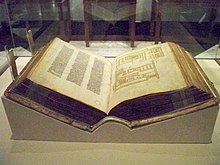This article needs additional citations for verification. (March 2024) |

| Part of a series on |
| Jews and Judaism |
|---|
Sephardic law and customs are the law and customs of Judaism which are practiced by Sephardim or Sephardic Jews (lit. "Jews of Spain"); the descendants of the historic Jewish community of the Iberian Peninsula, what is now Spain and Portugal. Many definitions of "Sephardic" also include Mizrahi Jews, most of whom follow the same traditions of worship as those which are followed by Sephardic Jews. The Sephardi Rite is not a denomination nor is it a movement like Orthodox Judaism, Reform Judaism, and other Ashkenazi Rite worship traditions. Thus, Sephardim comprise a community with distinct cultural, juridical and philosophical traditions.[1]
Sephardim are, primarily, the descendants of Jews from the Iberian Peninsula. They may be divided into the families that left Spain during the Expulsion of 1492 and those families that remained in Spain as crypto-Jews, fleeing in the following few centuries. In religious parlance as well as in modern Israel, the term is broadly used in reference to all Jews who have Ottoman or other Asian or North African backgrounds, whether or not they have any historic link to Spain, but some prefer to distinguish Sephardim proper from Mizraḥi Jews.[2]
For the purposes of this article, there is no need to distinguish Iberian Sephardi and Mizrahi Jews, as their religious practices are basically similar: whether or not they are "Spaniard Jews" they are all "Jews of the Spanish rite". There are three reasons for this convergence, which are explored in more detail below:
- Both groups follow general Jewish law, without those customs specific to the Ashkenazic tradition.
- The Spanish rite was an offshoot of the Babylonian-Arabic family of Jewish rites and retained a family resemblance to the other rites of that family.
- Following the expulsion the Spanish exiles took a leading role in the Jewish communities of Western Asia (the Middle East) and North Africa, who modified their rites to bring them still nearer to the Spanish rite, which by then was regarded as the standard.

- ^ Kahn, Margi Lenga. "Celebrating Sephardic traditions". stljewishlight.com. STL Jewish Light. Archived from the original on 28 July 2020. Retrieved 27 July 2020.
- ^ "Jewish Custom". myjewishlearning.com. My Jewish Learning.
